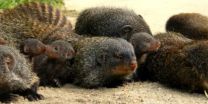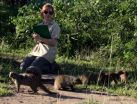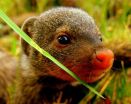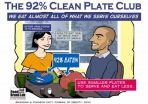(Press-News.org) Researchers studying banded mongooses in Uganda have discovered that those who work hard to care for pups may be less likely to invest in future offspring in the same way due to elevated stress hormones.
Dr Jennifer Sanderson, from the University of Exeter, has been observing wild banded mongooses to understand why working hard makes them less likely to work hard in the future.
She discovered that when a banded mongoose invests heavily to care for mongoose pups, it experiences an increase in circulating stress hormones (or 'glucocorticoids'), and these high stress levels inhibit similar investment in the future. The findings of the study are published today in the British Ecological Society's journal Functional Ecology.
When something you do now affects what you do in the future, scientists call it a 'carry-over effect'. Such carry-over effects are widespread in animal populations, but this NERC-funded study is the first to investigate the hormonal mechanism underlying behavioural carry-over effects.
According to Dr Sanderson: "Everybody knows that your past can affect your future, and behavioural ecologists have recently been using this phenomenon to explain why animals vary so much in how much they invest in caring for offspring. Our study has shown that carry-over effects are caused by changes to circulating glucocorticoids, or stress hormones, which is the first evidence of a physiological mechanism behind carry-over effects."
Dr Sanderson collected hundreds of faecal samples from the Ugandan mongooses which were then taken to a special Wildlife Endocrinology Lab at Chester Zoo where they were analysed for concentrations of hormones by the zoo's experts.
Dr Susan Walker, Chester Zoo's Scientific Manager added: "We've tested hundreds of mongoose faecal samples in our purpose-built endocrinology laboratory at the zoo, where we've looked specifically at levels of glucocorticoid hormones. The results from this research have shown that working hard to bring up pups in one season appears to influence the roles they will assume the following breeding season. This information is incredibly useful in ensuring we provide excellent husbandry for cooperatively breeding species in our care. Additionally, it's excellent that a zoo is able to play a key part in helping to expand our knowledge of animal behaviour in the wild."
Banded mongooses are close relatives of the famous meerkat and are found living in stable social groups across Central and Eastern Africa. They are highly social and breed cooperatively meaning that all individuals assist in offspring care even if they do not breed themselves.
The Banded Mongoose Research Project, led by Prof. Michael Cant of the University of Exeter, has been observing the mammals' investment into cooperative offspring care for over 20 years. Prof. Cant added, "If there is a carry-over effect of cooperative offspring care which is regulated by stress hormones we would expect to find 3 things: firstly that individuals with high stress levels are less likely to care for the pups, secondly that caring for pups causes stress levels to rise, and thirdly that this increase in stress continues after they have stopped caring for pups."
The results of the study confirm all of these predictions, and provide strong support for the hypothesis that carry-over effects arise because working hard to raise offspring causes increased concentrations of stress hormones, which inhibit future parental investment.
These findings provide new insight into the physiological regulatory mechanism behind carry-over effects and a better understanding of how stress associated with current behaviours can affect behaviours in the future.
INFORMATION:
'Hormonal mediation of a carry-over effect in a wild cooperative mammal' by Jennifer L. Sanderson, Andrew J. Young, Sarah J. Hodge, Solomon Kyabulima, Susan L. Walker and Michael A. Cant is published in the journal Functional Ecology.
Stress can make hard-working mongooses less likely to help in the future
2014-07-23
ELSE PRESS RELEASES FROM THIS DATE:
New model helps explain how provisions promote or reduce wildlife disease
2014-07-23
Athens, Ga. – Scientists have long known that providing supplemental food for wildlife, or resource provisioning, can sometimes cause more harm than good. University of Georgia ecologists have developed a new mathematical model to tease apart the processes that help explain why. Their research, which has implications for public health and wildlife conservation, appears in the Royal Society journal Biology Letters.
Wildlife of many kinds are increasingly finding their meals in human environments, gathering at places like backyard bird feeders, landfills or farms that offer ...
In asthma, it's not just what you smell, but what you think you smell
2014-07-22
PHILADELPHIA (July 22, 2014) – New research from the Monell Center reveals that simply believing that an odor is potentially harmful can increase airway inflammation in asthmatics for at least 24 hours following exposure. The findings highlight the role that expectations can play in health-related outcomes.
"Asthmatics often are anxious about scents and fragrances. When we expect that an odor is harmful, our bodies react as if that odor is indeed harmful," said study lead author Cristina Jaén, PhD, a Monell physiologist. "Both patients and care providers need to understand ...
The dopamine transporter
2014-07-22
Recent published research in the Journal of Clinical Investigation demonstrates how changes in dopamine signaling and dopamine transporter function are linked to neurological and psychiatric diseases, including early-onset Parkinsonism and attention deficit hyperactivity disorder (ADHD).
"The present findings should provide a critical basis for further exploration of how dopamine dysfunction and altered dopamine transporter function contribute to brain disorders" said Michelle Sahai, a postdoctoral associate at the Weill Cornell Medical College of Cornell University, ...
Alaska frogs reach record lows in extreme temperature survival
2014-07-22
Freezing and thawing might not be good for the average steak, but it seems to help wood frogs each fall as they prepare to survive Alaska's winter cold.
"Alaska wood frogs spend more time freezing and thawing outside than a steak does in your freezer and the frog comes back to life in the spring in better shape than the steak," said Don Larson, University of Alaska Fairbanks graduate student and lead author on a recent paper demonstrating that freeze tolerance in Alaska wood frogs is more extreme than previously thought.
Although wood frogs are well-studied freeze-tolerant ...
Study examines presence of uterine cancers at the time of hysterectomy using morcellation
2014-07-22
Among women undergoing a minimally invasive hysterectomy using electric power morcellation, uterine cancers were present in 27 per 10,000 women at the time of the procedure, according to a study published by JAMA. There has been concern that this procedure, in which the uterus is fragmented into smaller pieces, may result in the spread of undetected malignancies.
Despite the commercial availability of electric power morcellators for 2 decades, accurate estimates of the prevalence of malignancy at the time of electric power morcellation (in this study referred to as morcellation) ...
The 92 percent clean plate club
2014-07-22
If you're a member of the Clean Plate Club – you eat pretty much everything you put on your plate – you're not alone! A new Cornell University study shows that the average adult eats 92% of whatever he or she puts on his or her plate. "If you put it on your plate, it's going into your stomach," says Brian Wansink Ph.D., author of the forthcoming book, Slim by Design, Professor of Marketing and Director of the Cornell Food and Brand Lab.
Wansink and co-author Katherine Abowd Johnson analyzed 1179 diners and concluded that we're a Clean Plate Planet. Although diners ...
Essays in English yield information about other languages
2014-07-22
Computer scientists at MIT and Israel's Technion have discovered an unexpected source of information about the world's languages: the habits of native speakers of those languages when writing in English.
The work could enable computers chewing through relatively accessible documents to approximate data that might take trained linguists months in the field to collect. But that data could in turn lead to better computational tools.
"These [linguistic] features that our system is learning are of course, on one hand, of nice theoretical interest for linguists," says Boris ...
NASA's Fermi finds a 'Transformer' pulsar
2014-07-22
VIDEO:
Zoom into an artist's rendering of AY Sextantis, a binary star system whose pulsar switched from radio emissions to high-energy gamma rays in 2013. This transition likely means the pulsar's...
Click here for more information.
In late June 2013, an exceptional binary containing a rapidly spinning neutron star underwent a dramatic change in behavior never before observed. The pulsar's radio beacon vanished, while at the same time the system brightened fivefold in gamma rays, ...
Forty-five percent rise in diagnostic imaging tests by GPs -- new study
2014-07-22
A 45 per cent rise in diagnostic imaging tests ordered by Australian GPs is being driven by increasing GP visits, a rising number of problems managed at consultations and a higher likelihood that GPs order imaging tests for these problems, according to a new University of Sydney study released today.
Based on a long term national survey of 9,802 GPs between 2002 and 2012, the report draws on data from more than 980,000 GP-patient encounter records to assess the extent to which GP's order tests in line with diagnostic imaging guidelines.
"Most imaging tests ordered by ...
Gene variant identified as a heart disease risk factor for women
2014-07-22
When it comes to heart disease, Dr. Ross Feldman says women are often in the dark. Historically, it was thought that heart disease was a men's-only disease, however, data has shown that post-menopausal women are just as likely as men to get heart disease and are less likely to be adequately diagnosed and treated. New research from Western University published online this week in the British Journal of Clinical Pharmacology brings to light a genetic basis for heart disease in women and helps to identify which women are more prone to heart disease.
The study, led by Dr. ...






